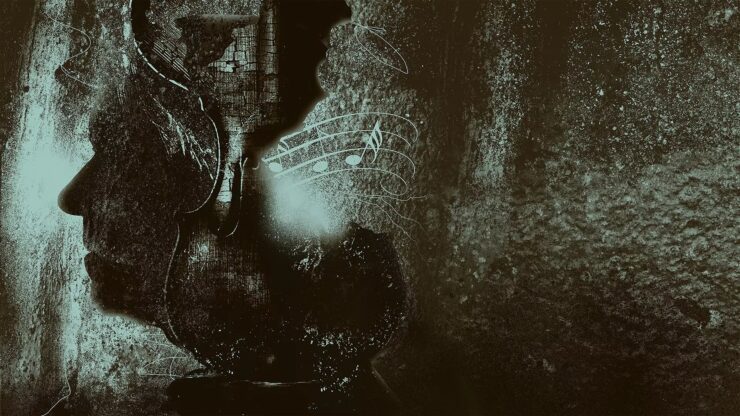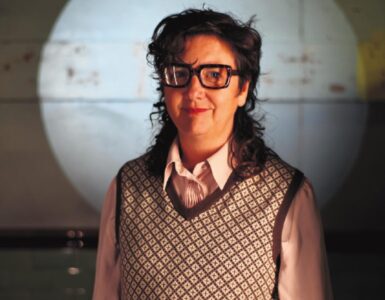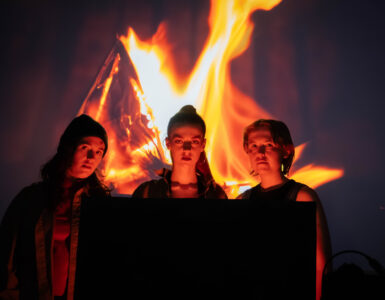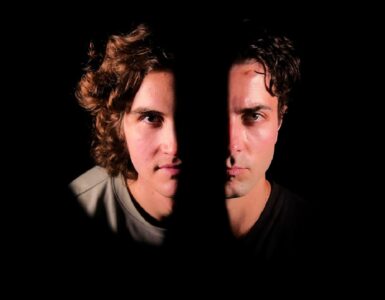A divine light shines down on Second Violinist Alan Gottlieb – though he can’t be sure where it is leading him it envelopes his love of music in a driving sense of ambition and frustration. The spiritual hand of composer Bach guides him each day through the drudgery of being grinded down by performing the same piece, in the same orchestra, with no recognition for his talent. He has been put on an ‘Excellence in Action’ plan to try and lift him out of his career slump, but Alan sees something greater than himself in his vocation, something celestial, entwining his fate and struggling mental health with a darker path than he might expect.
For a show that deals with a Kafkaesque HR process in a misguided and artistically delusional orchestra, there is a surprising amount of heart imbued in how it all comes together. Every part of the piece is draped in white, issuing an almost cult-like purity to the two world that Alan swings between. For a great deal of the piece it seems as though Alan is handling a Sisyphus-like task – drawn from the instrument and music he loves by the crushing weight of the corporate ladder. His raison d’etre has been obscured by a delusional Conductor who sees him as a cog in a machine, yet Alan knows he is destined for me. He flails and prances around the stage, meeting characters from his life, when it soon becomes clear that something more psychological is happening to him, and he falls down a rabbit hole he may well struggle to climb out of.
Chris Brannick plays Alan continually across the piece – he is our central focus but also our guide to the fluttering between the imaginary, the real, and the entirely abstract realm of creative harmony that seems to exist outside of both, and out of reach for Alan himself until the hand of Bach pulls him up. Biblical and poetic language interlaces symphonies and melodies from the man himself, but one of the triumphs of this show is that this rhythmic tongue never feels indulgent or unduly cerebral, instead plying at our sense of what it is to be a creative person, and how the boundaries of that creativity can drag you into the depths of your own mind. The central performance reduces Alan to something of a pitiful and strained man by the end of the piece, but displays a wonderful arc in unwinding his frustrations against a backdrop of unreachable artistic bliss.
Alan’s faith in Bach’s guiding hand leaves him feeling entitled to something more from his obsession with music, and this is what ultimately destroys him. The piece handles the overarching themes of mental health and creativity with a light touch – offering more to the human experience of those emotions in place of conceptualisation and abstraction. Faith grows from an undertone to the rising crescendo at the show’s finale, as Alan grapples with what lies beyond his own life, faith in Bach draws him along like a puppet string. It’s left up to interpretation as to what the replacement of a deity figure with Bach means – but to me, I saw Alan attest artistic greatness to the meaning of life, and he lets his career and personal life collapse under the weight of that great goal.
Karen Kirkup multi-rolls around Alan – playing an ominous figure that watches him from above, his colleague, his mentor, and the obstructive HR professional that beats him down. The players have wonderful chemistry that sees them dip and dive between the intense and the emotional. You step into a real pre-existing story world here, and the story never assumes too much of the audience, offering them a glimpse into a three-dimensional life story with facets galore. A real highlight is Kirkup’s portrayal of lauded musician ‘Hoffie’, who balances dry humour with a discussion of substance abuse and end-of-life care rather pleasingly. Sometimes the actors fumbled a word here or there, which could be easily tightened up, and I wondered about whether the moving staging and transitions were a little heavy-handed for an otherwise very fluid piece.
The absence of a physical musical instrument lends us gorgeous imaginative offerings for an audience – as Brannick mimes playing his characteristic violin, we realise it has an ethereal presence in his story, and understand more how music can be a sensation in his body as well as an application of his mind. While this works especially well, Alan himself is an instrument of Bach, Bach lives vicariously through him and he lives vicariously through Bach – and this show offers up something of a warning as to what might happen if we layer ourselves against our heroes too much. The vivid and obscure ending won’t be to everybody’s taste, and perhaps loses a little of the grit and darkness established in the story, but it certainly will keep you talking.
Contemplative, harmonic and often droll – this slick psychological drama rings with passion.
Recommended Drink: Bach was famously a coffee addict – so pair this piece with a smooth Espresso Martini to get intellectually stimulated.
Keep up with Two Foolish online for future showings of this production.









